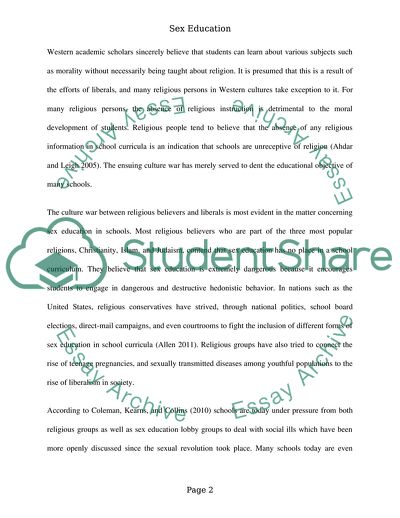Cite this document
(Sex Education Essay Example | Topics and Well Written Essays - 2500 words, n.d.)
Sex Education Essay Example | Topics and Well Written Essays - 2500 words. https://studentshare.org/sociology/1826720-sex-education-should-teach-chastity-and-virginity-before-marriage-and-faithfulness-and-loyalty-within-marriage-islamic-academy-how-does-this-view-fit-within-the-current-debate-between-government-policy-on-sex-education
Sex Education Essay Example | Topics and Well Written Essays - 2500 words. https://studentshare.org/sociology/1826720-sex-education-should-teach-chastity-and-virginity-before-marriage-and-faithfulness-and-loyalty-within-marriage-islamic-academy-how-does-this-view-fit-within-the-current-debate-between-government-policy-on-sex-education
(Sex Education Essay Example | Topics and Well Written Essays - 2500 Words)
Sex Education Essay Example | Topics and Well Written Essays - 2500 Words. https://studentshare.org/sociology/1826720-sex-education-should-teach-chastity-and-virginity-before-marriage-and-faithfulness-and-loyalty-within-marriage-islamic-academy-how-does-this-view-fit-within-the-current-debate-between-government-policy-on-sex-education.
Sex Education Essay Example | Topics and Well Written Essays - 2500 Words. https://studentshare.org/sociology/1826720-sex-education-should-teach-chastity-and-virginity-before-marriage-and-faithfulness-and-loyalty-within-marriage-islamic-academy-how-does-this-view-fit-within-the-current-debate-between-government-policy-on-sex-education.
“Sex Education Essay Example | Topics and Well Written Essays - 2500 Words”. https://studentshare.org/sociology/1826720-sex-education-should-teach-chastity-and-virginity-before-marriage-and-faithfulness-and-loyalty-within-marriage-islamic-academy-how-does-this-view-fit-within-the-current-debate-between-government-policy-on-sex-education.


